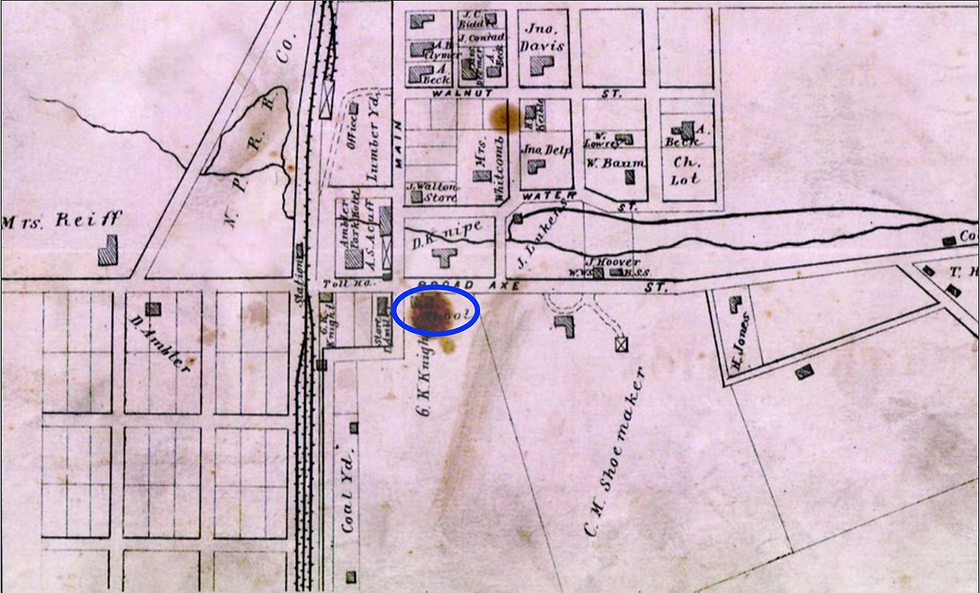Joseph Foulke, Sr. and Gwynedd Boarding School
- Yen Ho
- Aug 15, 2020
- 4 min read
Updated: Sep 16, 2021
Joseph Foulke (1786-1863) was the son of Hugh and Ann Foulke, descended from one of the most "famous" early families in Lower Gwynedd. He conducted a private school in Gwynedd for boys. Before he became a teacher, he was a minster for more than 40 years.
During his life he learned the trade of a wheelwright, and he was about to pursue his career on that until he turned to teaching. In 1811, Joseph took charge at the Friends' School in Plymouth Township, and stayed there for 6 years. He taught one year at Upper Dublin. In autumn 1818, Joseph established a boarding school for young men and boys. His school was a success. In 1860, the school was turned over to his sons Daniel and Joseph, Jr., and his nephew Hugh, Jr., who took over as the principal of the boarding school. Soon after the school closed down.
The school once stood on Joseph's property on Bethlehem Pike near Spring House.
Joseph's nephew, and Daniel and Joseph Jr.'s cousin, Dr. John L. Foulke, was one of his students at Gwynedd Boarding School.
Joseph's namesake son Joseph (1827-?) was also one of his students. Interestingly enough, like his cousin John, he was also a physician. He graduated from University of Pennsylvania's medical school in 1854, and began practice in Philadelphia. He stayed there until 1857 when he travelled to Europe and attended medical schools in Paris and London. He resumed practice in the US in 1859 at Buckingham, PA.
His first case was puerperal eclampsia where he bled* freely, leading to a successful treatment.
*NOTE: Bloodletting was a common practice in the medical field during the 18th century. Benjamin Rush was known to bled his patients.
From 1848-1852, Joseph Jr. was the principal of Gwynedd Boarding School. Following his father's footsteps, he performed astronomical calculations for "Friends' Almanac."
In 1836, Joseph travelled to Washington D.C. with the Philadelphia Yearly Meeting to influence Congress against the admission of Arkansas as a slave state.
Joseph also wrote a memoir of Jacob Ritter, a Revolutionary War Solider.
His family (including his wife and his sons Daniel and Joseph, Jr.) were featured on the 1850 census data.
I did 2 posts about the Foulke family, and for some reason, I forgot to mention about this person. It's possibly because I was focused on the "famous" relatives of the Foulke family. But, since this is back-to-school season, I'm given a second chance to talk about the other relative in the Foulke Family.

Recollection of Gwynedd Schools in the Late 1700's from Quaker minister and educator Joseph Foulke (1786-1863):
"My earliest recollection of schools which I attended was at Gwynedd meeting. There was no house for the purpose, but what was called 'the little meeting-house" was used. An old tottering man by the name of Samuel Evans was the teacher. The reading books were the Bible and Testament: we had Dilworth's Spelling Book and Dilworth's Assistant or Arithmetic. Grammar was a thing hardly thought of; there was, however, a small part of the spelling-book called 'A New Guide to the English Tongue', and a few of the older pupils learned portions of this by rote, and would occasionally recite to the master, but the substance appeared to be equally obscure both to master and scholar.
My next schooling was in 1795, in the house late the property of William Buzby, on the Bethlehem Road, above the Spring-House. It was a kind of family school, taught by Hannah Lukens. I next went to Joshua Foulke, my father's elder brother, and an old man. He taught in the log schoolhouse, near the eighteen-mile stone on the Bethlehem road. My father, with the help of his neighbors, built this house [about 1798], on a lot set apart for this purpose, at the southern extremity of his premises. This log school-house stood about thirty years, and besides Joshua Foulke, we had for teachers William Coggins, Hannah Foulke, Benjamin Albertson, Hugh Foulke (my brother), John Chamberlain, Christian Dull (Jr.), Daniel Price, and Samual Jones (I have probably not named all, or given them in the order in which they came).
The Free School of Montgomery, however, was more popular. The salary there, $160 a year, secured more competent teachers than other schools in the neighborhood. I can remember when the teacher's pay was from a dollar to ten shilings per quarter for each scholar, and he obtained his board by going about from house to house among his employers, and it was a remark that people would trust a teacher to instruct their children to whom they would not lend a horse!"

Bibliography:
Atkinson, William B. The Physicians and Surgeons of the United States. (Philadelphia: Charles Robson, 1878): 532.
Friends' Intelligencer and Journal. Vol. 23, no. 1155 (Philadelphia, 1895): 433.
Jenkins, Howard Malcolm. Historical collections relating to Gwynedd, a township of Montgomery County, Pennsylvania, settled, 1696, by immigrants from Wales, with some data referring to the adjoining township, of Montgomery, also settled by Welsh. (Philadelphia: Howard Malcolm Jenkins, 1897): 233-281, 439-440.




Comments